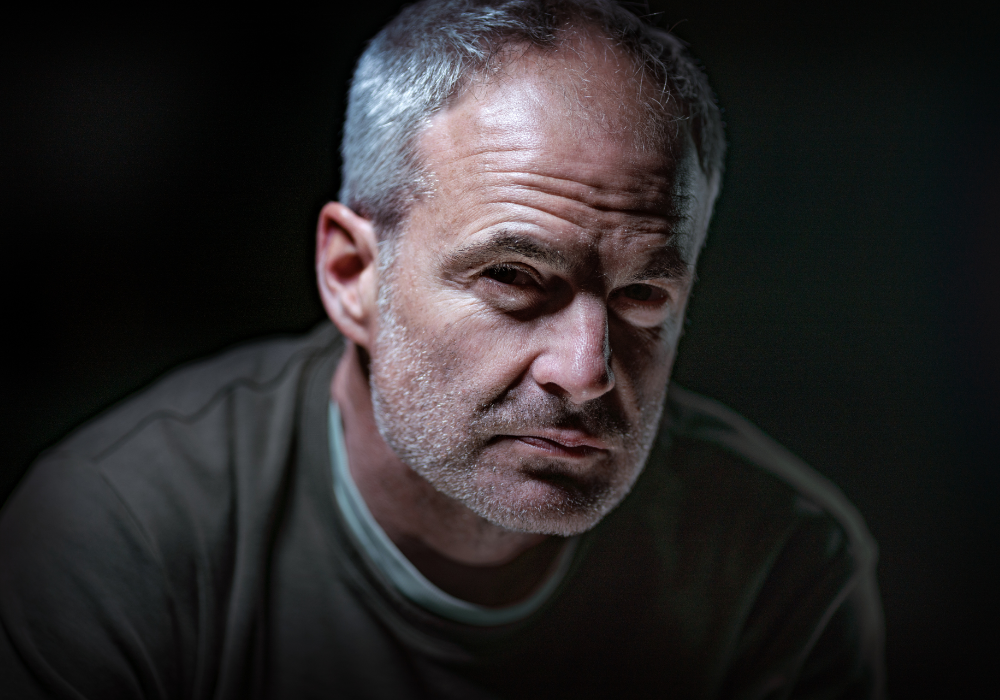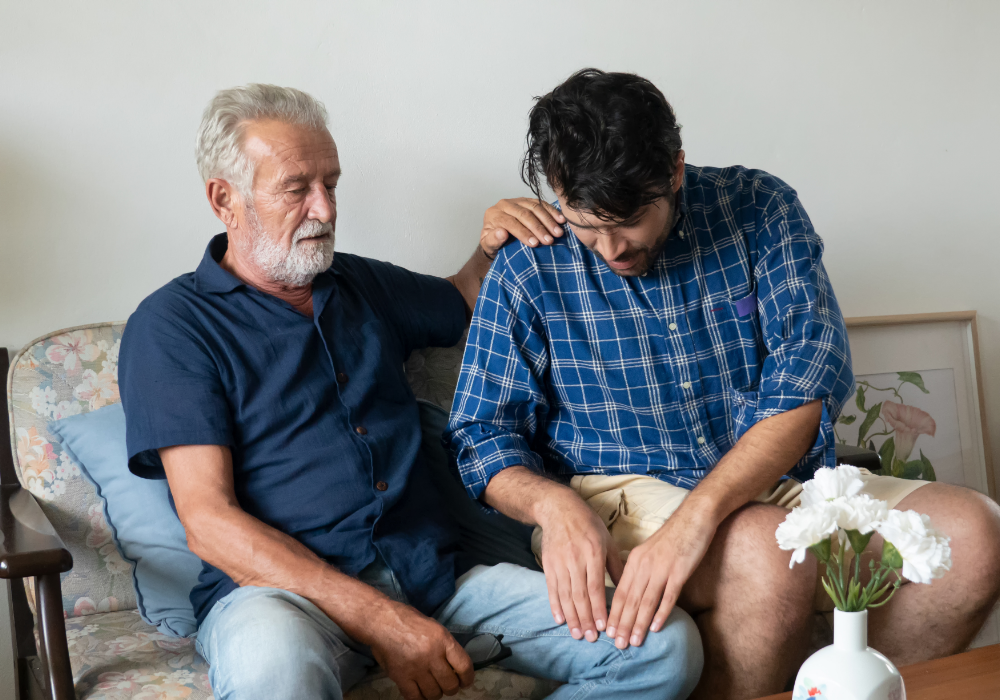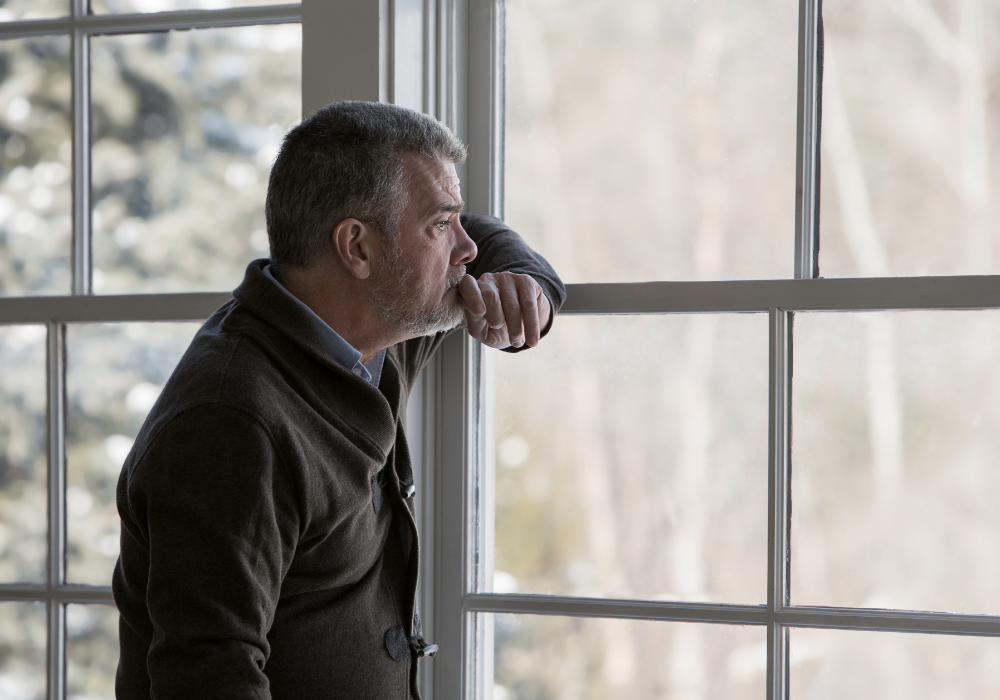These silent struggles are stealing their joy, confidence, and sense of purpose.

There’s a silent kind of suffering a lot of middle-aged men carry—but barely talk about. It doesn’t always show up in obvious ways. Sometimes it looks like tired eyes, short tempers, or a sudden disinterest in everything they used to enjoy. Other times, it’s hidden behind jokes, distractions, or workaholic habits that seem productive on the surface. For years, men have been expected to hold it all together, be the strong one, the provider, the fixer. Admitting they’re struggling often feels like failure, so they don’t.
They push through, stay quiet, and hope it passes. But the pressure builds—and it’s crushing more men than anyone realizes. Just because someone looks fine doesn’t mean they are. Middle age isn’t just a phase of life. For many men, it’s a slow unraveling that happens in silence. And unless we start naming it, that silence will keep doing damage no one sees coming.
1. They feel invisible and unneeded—even in their own homes.

There comes a point when middle-aged men stop being the center of attention. Kids grow up, careers plateau, and suddenly they’re no longer the guy everyone turns to—they’re just kind of… there. They might still be providing, fixing things, or showing up in all the ways they always have, but no one really notices. It’s like being in the background of your own life. That quiet shift can make a man feel completely invisible, even to the people he loves most, notes relationship coach Matthew Fray in an article on Substack.
Feeling unneeded doesn’t always lead to loud complaints—it usually shows up as emotional distance, silence, or low-grade sadness that just lingers. Men are often taught not to seek validation, but losing your sense of importance stings, no matter how tough you are. When home doesn’t feel like a place where you matter, it becomes harder to connect. Over time, that kind of emotional fading takes a heavy toll. Feeling unseen isn’t weakness—it’s loneliness in disguise.
2. The pressure to be “strong” keeps them silent about their struggles.

Most men are raised with one clear rule: don’t show weakness. That means no tears, no fear, no talking about what’s really going on inside. So when life starts getting heavy—whether it’s stress, depression, or burnout—they keep it to themselves, remarks Matt Branham in an article for Man Enough. Admitting they’re overwhelmed feels like breaking the code. Even when they want to open up, they worry it’ll make them look weak, needy, or not “man enough.” So they suffer in silence, trying to fix things on their own or pretend nothing’s wrong. The problem is, silence doesn’t solve pain.
It just buries it deeper, where it starts to mess with everything else—relationships, health, self-worth. Being strong shouldn’t mean carrying it all without help. But a lot of men still believe asking for support means they’ve failed. That outdated belief is crushing guys who desperately need to talk but don’t feel like they’re allowed to. Eventually, the silence becomes heavier than the problem itself.
3. They’re stuck between caring for aging parents and supporting adult kids.

Middle-aged men are often caught in what’s called the “sandwich generation”—still responsible for their grown kids while also helping their elderly parents. It’s a constant tug-of-war. They’re expected to be available, helpful, and financially supportive on both ends, while also trying to manage their own lives, according to experts at Mental Health America.
That kind of pressure doesn’t always explode—it just slowly grinds them down. One minute they’re helping with tuition or bills, the next they’re scheduling doctor appointments or driving their parents to the pharmacy. There’s little space to breathe, let alone take care of their own needs.
They’re sandwiched between generations that both need them, yet no one’s checking in to ask how they’re doing. That kind of chronic responsibility can make even simple things feel overwhelming. They don’t complain, because it feels selfish. But behind the scenes, they’re often emotionally and physically exhausted. Caregiver burnout is real, and for men, it’s rarely acknowledged until they completely crash.
4. They don’t know who they are outside of their work.

For years, work gives men identity, purpose, and structure. It’s the thing that makes them feel useful, valuable, and in control. But what happens when the job changes—or ends? Suddenly they’re left staring at a life that feels unfamiliar. Without the title, the office, or the daily routine, a lot of men feel lost. They’ve spent so long tying their worth to what they do that they don’t know how to just be. Even during working years, if the passion fades or the career feels stagnant, that sense of meaning starts to crumble. Hobbies may feel pointless.
Relationships might feel distant. And in the quiet moments, there’s this uncomfortable question: Who am I now? Most guys don’t have a Plan B for purpose. So instead of exploring, they shrink. They go numb, overwork, or check out emotionally. The scariest part isn’t losing a job—it’s realizing you’ve never really built an identity outside of it.
5. Their friendships have quietly faded—and no one talks about it.

By middle age, a lot of men have drifted away from the friendships that used to keep them grounded. Life gets busy. Jobs, families, and responsibilities take over, and suddenly it’s been years since they grabbed a beer or opened up to someone who actually gets them. Unlike women, who are often better at maintaining emotional bonds, many men let those connections fade without realizing how much they need them. Friendships get replaced by acquaintances, coworkers, or surface-level chats that never go deep.
The result? A quiet, creeping loneliness. They might not even be aware of it until something big happens and they realize they’ve got no one to call. Loneliness in men doesn’t always look like sadness—it often shows up as anger, withdrawal, or workaholism. Having no one to talk to about real stuff can make even small problems feel massive. And yet, most guys will never admit how much they miss having a friend who actually listens.
6. They feel like their bodies are breaking down faster than they expected.

Middle age has a way of sneaking up on guys. One day they’re lifting furniture without a second thought, the next they’re throwing out their back reaching for a sock. Joints ache, energy dips, recovery takes longer, and nothing works quite like it used to. It’s frustrating, especially for men who once prided themselves on being strong and active. Even if they’re still in decent shape, things don’t feel the same—and that can really mess with their confidence.
Add in weight gain, hair loss, or health scares, and suddenly their body feels like it’s turning against them. They might not talk about it, but they notice every change. It’s not just about vanity—it’s about losing control over something that once made them feel powerful. For many, the physical decline triggers deeper questions about aging, usefulness, and mortality. That internal shift doesn’t always get addressed, but it quietly chips away at how they see themselves.
7. They’re quietly grieving the dreams they didn’t chase.

By the time men hit middle age, they’ve often made a lot of choices—some good, some necessary, and some they now question. Maybe it was the career path that paid the bills but never sparked joy. Maybe it was the hobby they dropped, the trip they never took, or the business they never started. Whatever the case, there’s often a quiet ache for the life they didn’t live.
They don’t usually talk about it, but it lingers. It shows up in moments of reflection, scrolling social media, or watching someone younger take the risks they once avoided. It’s not always regret—it’s grief. Grief for the version of themselves they had to let go of in order to be responsible. That kind of mourning doesn’t make a scene, but it weighs heavy. For some men, it sparks a midlife crisis. For others, it just becomes a low, constant hum of “what if?” that never really goes away.
8. They feel emotionally disconnected—but don’t know how to fix it.

Middle-aged men often wake up one day and realize they feel distant—from their partner, their kids, their friends, even themselves. They’re going through the motions, but something feels hollow. Conversations stay surface-level, and emotional intimacy starts to feel like a foreign language.
Part of it is conditioning—many were never taught how to talk about feelings in the first place. So when relationships need vulnerability, they freeze or shut down. The worst part? They want to connect. They just don’t know how. That gap leads to frustration, tension, and in some cases, emotional numbness. They may look calm on the outside but feel completely untethered inside.
Fixing it would mean unlearning decades of emotional habits—and that’s overwhelming. So instead of reaching out, they often retreat further. Disconnection isn’t always loud—it can be quiet, slow, and deeply isolating. By the time they realize how far they’ve drifted, it can feel almost impossible to find their way back.
9. They’re afraid to admit how lost they feel about aging.

Getting older isn’t just a number—it’s a full-on identity shift. A lot of men don’t know how to deal with the fact that they’re not young anymore, but they’re not “old-old” yet either. They’re in this weird middle zone where they feel pressure to still be strong, productive, and ambitious—but also feel tired, unmotivated, or unsure of what comes next. It’s not just physical aging that freaks them out—it’s the emotional shift. Who are they becoming? What do they have left to prove? What does success even look like at this stage?
Most guys won’t say this out loud, but they’re scared. Scared of becoming irrelevant. Scared of losing their edge. Scared of realizing they’ve built a life around goals that don’t fit anymore. That confusion doesn’t always look like fear—it shows up as restlessness, anger, or apathy. Underneath it all, there’s often a man who’s just trying to figure out what aging really means, and how to do it without falling apart.
10. They carry financial stress they feel they can’t talk about.

Money pressure hits different in middle age. It’s not just about paying bills—it’s about college tuition, aging parents, mortgage payments, and retirement that suddenly doesn’t feel so far away. Even men who appear “comfortable” on the outside are often doing quiet math in their heads, wondering how long they can keep this all going. The expectation to be the financial backbone doesn’t go away, even when income dips or expenses spike. But talking about money struggles? That feels taboo.
Admitting fear about finances can feel like admitting failure, especially for men who’ve always equated their worth with their ability to provide. So they keep it in. They stress alone, worry in silence, and try to appear calm even when the pressure feels unbearable. This kind of financial anxiety isn’t just about numbers—it chips away at their confidence, their sleep, and their sense of security. The longer they hide it, the heavier it becomes.
11. They’re haunted by the idea that their best years are behind them.

There’s a moment many men hit in midlife where they start wondering, Is this as good as it gets? The dreams they once had seem further away, their energy isn’t the same, and the future feels more uncertain than ever. Even if life is “fine,” there’s often a sense that the most exciting chapters might already be over. That thought doesn’t always come with a meltdown—it’s more like a slow ache that creeps into quiet moments. Regret mixes with nostalgia, and suddenly the past feels golden while the future feels… gray.
Some men fight it by chasing thrills or reinventing themselves. Others just feel stuck, unsure how to create something new when they’re already so far into the story. The belief that the best parts of life are behind them can be deeply demotivating. But most won’t talk about it—they’ll just carry that quiet sadness and keep going through the motions.
12. They feel unappreciated no matter how hard they try.

Men in middle age often keep showing up—at work, at home, in their relationships—but feel like no one really sees the effort. They take care of the house, stay loyal, provide for the family, and try to do the right thing, yet rarely hear “thank you.”
Over time, that lack of recognition starts to eat away at their motivation. It’s not that they expect applause, but when no one notices your quiet sacrifices, it’s hard not to feel invisible. Many were raised to believe that being dependable was enough. But being needed isn’t the same as being valued.
That subtle distinction leaves a lot of men feeling used up but emotionally empty. They stop trying to express their needs because they assume it won’t make a difference. Eventually, that kind of chronic underappreciation becomes more than frustration—it turns into emotional burnout. They’re still doing everything—but they’re doing it on autopilot, with a heart that’s quietly going numb.
13. They’re battling shame over mistakes they can’t undo.

By midlife, every man carries some kind of regret. Maybe it’s a failed marriage, a missed opportunity, or a broken relationship they wish they’d handled differently. While time moves on, those past mistakes stick around. And for many men, shame becomes a constant companion. They don’t talk about it, because shame is heavy and personal—and bringing it up feels like peeling off armor they’ve worn for decades.
But that silence only makes it worse. They replay conversations, wonder what might have been, and beat themselves up for things they can’t fix. Forgiving themselves isn’t easy, especially when they’ve been taught to “man up” and move on. That internal guilt keeps them emotionally stuck. It stops them from being present and robs them of peace. Without a safe space to talk through those regrets, many men simply carry the weight, pretending it’s not there—while it slowly wears them down.
14. They don’t feel safe being vulnerable with anyone.

Even in a world that’s talking more about men’s mental health, a lot of guys still don’t feel safe opening up. They worry they’ll be judged, misunderstood, or told to “get over it.” So they keep everything locked inside, only showing the version of themselves that feels acceptable. Vulnerability feels like exposure. And exposure feels dangerous. They might crack a joke instead of admitting they’re overwhelmed, or change the subject when things get too real. That emotional wall keeps them protected—but also keeps them alone.
It blocks the very connection they crave. For many men, it’s not that they don’t want to open up. They’ve just never been shown how to, or been given permission to do it without shame. Until they feel safe being honest—really honest—they’ll stay guarded, even in their closest relationships. And that armor, while useful in tough moments, becomes a prison over time.